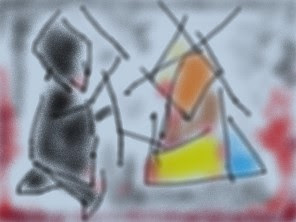VAL: Thousands of young protesters have been arrested. Their future greatly affected. At least one person has been killed. Many seriously injured. Facilities have been damaged; businesses closed down; jobs lost; relationships broken. Some people, including young people and police officers, will suffer psychologically for many years to come. What can be done?
LI: I was recently reminded of this story: A Zen Buddhist master (法眼禪師 fǎyǎn chánshī - Method Eye zen teacher) asked his students: "There is a fierce tiger with a bell on its neck. Who can undo the bell from the tiger?" The monks looked at each other, but none could answer. An uncouth young monk (法燈禪師 fǎ dēng chánshī – Method Lamp zen teacher) walked past. Other monks looked down on him. The master stopped the young monk and asked him the question. He responded: "It is, of course, the person who tied the bell on the tiger."
VAL: That is the story of 解鈴還須繫鈴人 (jiě líng hái xū xì líng rén). In other words, ‘To untie the bell, the person who tied the bell is needed.’ How does that relate to the Hong Kong situation?
LI: The moral of the story is that the people who started the problem in the first place should be the ones to resolve the problem.
VAL: The police started the problem, didn’t they?
LI: If the demonstrations were lawful and non-violent, police hardly have to get involved. Initially, young protesters were not involved as well. So the police and young protesters, who are affected most by the current situation, did not start the problem in Hong Kong initially. They are like the two ends of the string that ties the bell on the tiger’s neck. They are not the ones who can untie the bell.
VAL: Beijing is behind all this. They are the ones who started the problem, aren’t they?
LI: Hong Kong is a city of China; it is normal for China to want to have influence in Hong Kong. It is also clear now that US, Taiwan and perhaps others, are interfering in internal politics of Hong Kong. So there are outside influences. But the problem of Hong Kong should be handled by Hong Kong people.
VAL: So who are the people responsible for starting the problem?
LI: I think the Hong Kong politicians, going back to at least before the 2014 Occupy Central Protest who could not agree on the way ahead for Hong Kong, are primarily the people who started the problem. It was their responsibility to lead. They collectively failed. Then there are the community leaders of the pro-democracy movement who promoted unlawful and violent demonstrations. I believe these people got it wrong. Unlawful and violent demonstrations are getting Hong Kong nowhere but down a destructive path to economic failure and social schism. Along the way, many young people are greatly harmed. These people, who promoted unlawful and violent demonstrations, have to recognize their mistakes.
VAL: I don’t support violence demonstrations, but I believe peaceful civil disobedience is reasonable; even though it is illegal, it is a valid form of protest.
LI: I believe unlawful civil disobedience, in Hong Kong at least, led to violent demonstrations and the chaotic situation we have now in Hong Kong. So I believe Hong Kong people need to re-establish their respect for law and order; and avoid illegal protest. Nevertheless, we can agree to disagree on whether people should engage in civil dis-obedience protest.
VAL: We do agree that there should be no violent demonstrations. What do you think politicians and pro-democracy leaders should do?

LI: If I have a magic wand, I would lock them up in a room until they come up with an agreement on how to resolve the current problem. One obvious thing is to come up with a joint statement that all violent demonstrations should stop.
VAL: That sounds reasonable and achievable. Perhaps it is time that these politicians and community leaders who started the problem act responsibly, and let young people go back to schools and others back to work.
LI: We are like the young uncouth monk 法燈禪師 who came up with the simple answer.
Note: This is a fictional dialogue. Photos are based on photos by Ian Robinson and Jarylle Adriane Paloma on Unsplash.







